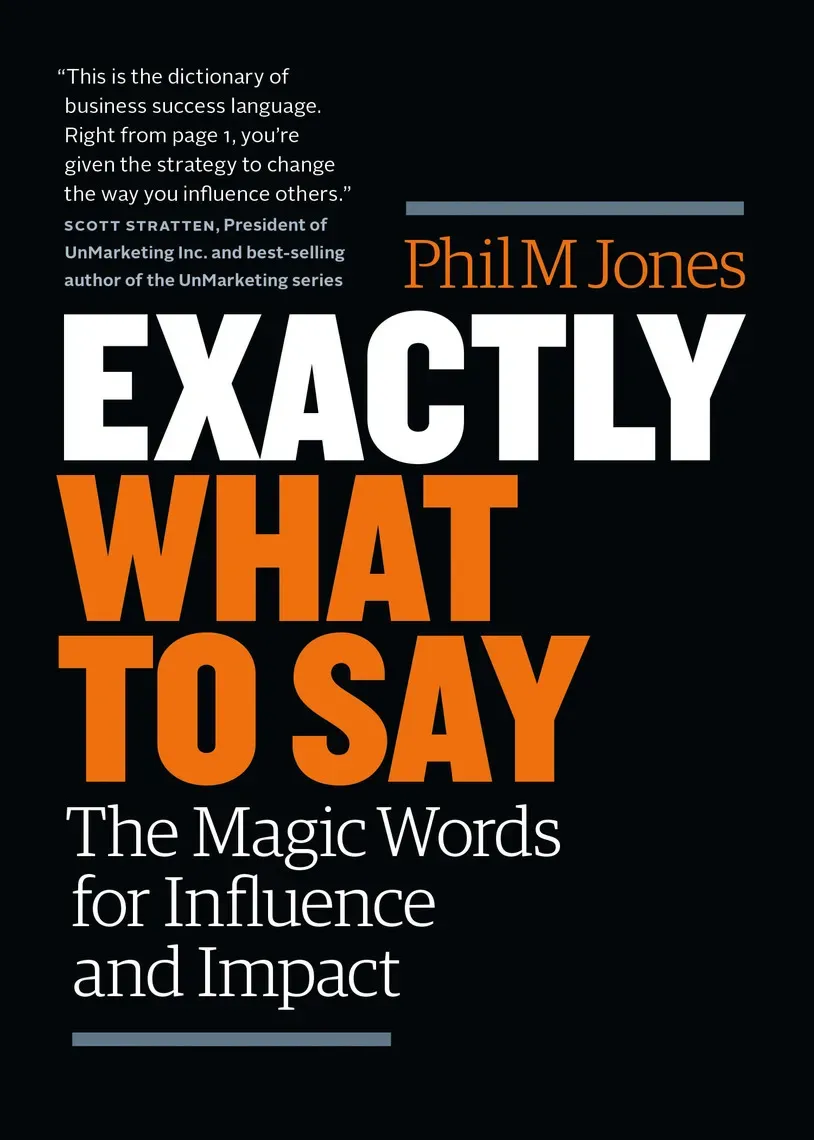Exactly What to Say – Phil Jones

There are two types of people in this world: those who resist change in favor of nostalgia and those who move with the times and create a better future.
Using words that talk straight to the part of the brain that is free from maybes and responds on reflex gives you a fair advantage in conversation and can result in you getting your own way more often.
You Have Three Options
When it comes to decision-making, we are notoriously susceptible to being fooled by both our emotions and our reason. We also tend to suffer from analysis paralysis when we have to choose from a number of options.
A good way to take control of situations such as these is by offering only three options; afterward, just ask the other person, “Of those three options, what’s going to be easier for you?”
The Good News
Even if the good news follows the worst news, it always tends to bring some relief.
The formula is even more powerful if there is no bad news. Everybody wants some positivity in his/her life, and “The good news is…” is the magic word to infuse it!
Just Out of Curiosity
Sometimes, people say “no” – and are adamant about not changing their minds. Don’t give up, try another magic combo.
Examples
- Just out of curiosity, what is it specifically you need some time to think about?
- Just out of curiosity, what is it that’s stopping you from moving forward with this right now?
What Do You Know?
All people think they know best—that’s how we’re built to think. And if you want to steer a conversation in a certain direction, you have to have control over it.
A great way to achieve this is by shifting the other person’s position “from one of certainty to one of doubt.” Hence the question, “What do you know?” magic phrase
What do you know? Examples
- What do you know about everything that has changed since (insert event)?
- What do you know about how things really work here?
Use Magic Words
Magic words are sets of words that talk straight to the subconscious brain. The subconscious brain is a powerful tool in decision-making because it is preprogrammed through our conditioning to make decisions without overanalyzing them.
Your aim shouldn’t be to move a person from “no” to “yes”—rather, you should focus on turning a “maybe” into a decision. And don’t fall into the trap of thinking that simple means small results—these tips and tricks could change everything about the way you get work done.
How Would You Feel If?
Nothing motivates us more than losing what we already own. So paint for your listener a future scenario so that you can trigger in him the proper emotions.
Examples:
- How would you feel if your competition passed you? (the “loss aversion” trigger)
- How would you feel if this decision led to your promotion? (the “if-success” trigger; “loss aversion” in absentia).
Two Types of People
If you want to prompt a near-instant decision, then frame the options within the “two types of people” narrative.
There are two types of people in this world: those who leave their personal financial success in the hands of their employers and those who take full responsibility and build their own futures.
There are two types of people in this world: those who resist change in favor of nostalgia and those who move with the times and create a better future.
The Power of Stories
As a species, we are hardwired for narrative: stories help us understand the world around us, empathize with others, analyze the past, and make decisions for the future.
When you want someone to make a decision in your favor, whether it’s to purchase a product, collaborate with you, or simply agree with your point of view, invoking their imagination can be a powerful trigger.
- Just imagine how things will be in six months once you have implemented this.
- Just imagine the look on your kids’ faces when they see you achieve this.
Keep It Simple
For many people, there is a common urge to dig into the details—especially for those that consider themselves experts on a particular topic.
Especially for those selling technical products or services, big-ticket items, or intangibles—the urge to dive right into details is strong. However, it’s often much more effective to resist the urge to geek out on the details, and keep responses at a very high level.
Keep it simple: what is the outcome you’re trying to solve? Remember that people typically make decisions based on feelings, with logic coming second.

